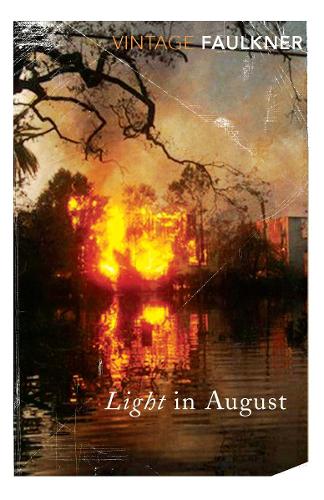
Light in August
(Paperback)
Available Formats
Publishing Details
Light in August
By (Author) William Faulkner
Vintage Publishing
Vintage Classics
3rd November 2000
5th October 2000
United Kingdom
Classifications
General
Fiction
Narrative theme: Interior life
Narrative theme: Social issues
813.52
Physical Properties
Paperback
384
Width 129mm, Height 198mm, Spine 24mm
272g
Description
Winner of the Nobel Prize for Literature A landmark in American fiction, Light in August explores Faulkner's central theme- the nature of evil. Joe Christmas - a man doomed, deracinated and alone - wanders the Deep South in search of an identity, and a place in society. After killing his perverted God-fearing lover, it becomes inevitable that he is pursued by a lynch-hungry mob. Yet after the sacrifice, there is new life, a determined ray of light in Faulkner's complex and tragic world.
Reviews
Burns throughout with a fierce indignation against cruelty, stupidity and prejudice - a great book * Spectator *
Faulkner has inexhaustible invention, powerful imagination, and he writes, generally, like an angel -- Arnold Bennett
By universal consent of critics and common readers, Faulkner is now recognised as the strongest American novelist of the century, clearly surpassing (Ernest) Hemingway and (Scott) Fitzgerald, and standing as an equal in the sequence that includes Hawthorne, Melville, Mark Twain and Henry James -- Harold Bloom
Magisterial * Independent *
Author Bio
Born in 1897 in New Albany, Mississippi, William Faulkner was the son of a family proud of their prominent role in the history of the south. He grew up in Oxford, Mississippi, and left high school at fifteen to work in his grandfather's bank. Rejected by the US military in 1915, he joined the Canadian flyers with the RAF, but was still in training when the war ended. Returning home, he studied at the University of Mississippi and visited Europe briefly in 1925. His first poem was published in The New Republic in 1919. His first book of verse and early novels followed, but his major work began with the publication of The Sound and the Fury in 1929. As I Lay Dying (1930), Sanctuary (1931), Light in August (1932), Absalom, Absalom! (1936) and The Wild Palms (1939) are the key works of his great creative period leading up to Intruder in the Dust (1948). During the 1930s, he worked in Hollywood on film scripts, notably The Blue Lamp, co-written with Raymond Chandler. William Faulkner was awarded the Nobel Prize for Literature in 1949 and the Pulitzer Prize for The Reivers just before his death in July 1962.
